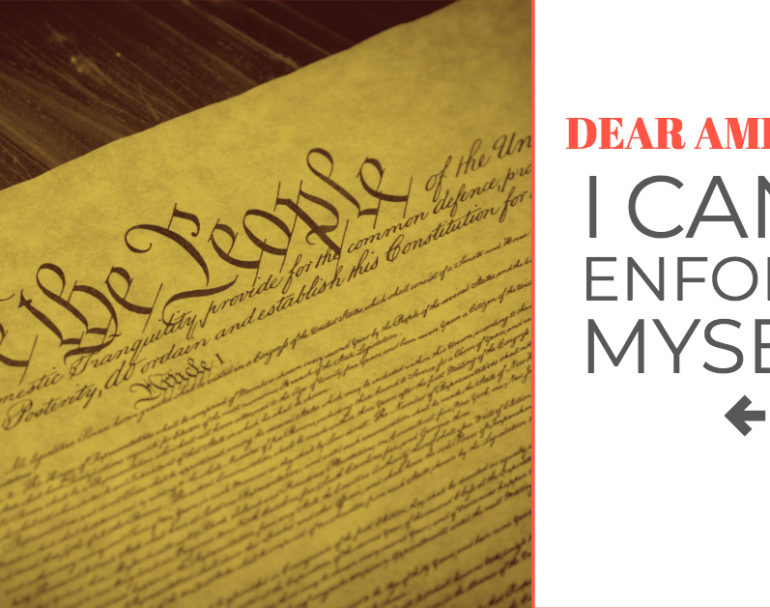
Don’t Blame the Constitution for Your Loss of Liberty
Some people want to blame the intrusive, overreaching federal government we have today on the Constitution.
Many cite a quote fro 19th-century anarchist Lysander Spooner drive home their point:
“But whether the Constitution really be one thing, or another, this much is certain – that it has either authorized such a government as we have had, or has been powerless to prevent it. In either case it is unfit to exist.”
But if you really stop and think about it, this argument is silly. As Tenth Amendment Center executive director Micheal Boldin said in a tweet, “You can’t blame an inanimate object for the loss of liberty. Words on paper can’t cause or prevent anything, no matter how many times you quote Spooner.”
James Madison called constitutions “parchment barriers,” and said they were insufficient to stop “the encroaching spirit of power” on their own. In Federalist #48, Madison wrote:
“A mere demarcation on parchment of the constitutional limits of the several departments, is not a sufficient guard against those encroachments which lead to a tyrannical concentration of all the powers of government in the same hands.”
In his seminal commentary on the Constitution, St. George Tucker, the most prominent legal mind of his time, reiterated the insufficiency of “parchment chains.”
“All governments have a natural tendency towards an increase, and assumption of power; and the administration of the federal government, has too frequently demonstrated, that the people of America are not exempt from this vice in their constitution. We have seen that parchment chains are not sufficient to correct this unhappy propensity.”
Think of it this way. Let’s say you and I agree to a contract. After a few months, I start ignoring and violating various provisions. You don’t do anything about it. Eventually, I have completely disregarded our agreement.
Would you blame the contract?
Of course not. It wasn’t the contract’s fault. It was perfectly fine. We both knew what we agreed to. The fault lies with you because you didn’t do anything about it when I started violating its provisions. It’s your fault you didn’t enforce the contract – not the contract’s fault!
The same holds true for the Constitution. We know the limits it places on federal power. James Madison gave us a blueprint to fight back when the federal government enacts “unwarrantable measures” or even warrantable measures that happen to be unpopular. States were intended to serve as a check on federal power. They were expected to resist and nullify unconstitutional actions. It’s not the Constitution’s fault we’ve failed to take action to stop federal overreach. That, my friends, is on each one of us!
You’ve probably heard the quote:
“Eternal vigilance is the price of liberty.”
That quote is generally attributed to Thomas Jefferson, but he’s not the one who said it. The credit actually goes to Wendell Phillips, a staunch abolitionist activist in the 1840s and 1850s. The short version is plenty poignant and relates to the problem of constitutional government. We can’t just depend on words on parchment. We have to remain vigilant and fight back when those in positions of authority try to cross the lines limiting their power. The Constitution doesn’t have eyes, ears or arms. It can’t stop the encroachment. We have to – and it starts with vigilance.
Put in full context, the quote offers an even more powerful lesson to those who pin the blame for overreaching government on the failure of parchment barriers.
“Eternal vigilance is the price of liberty; power is ever stealing from the many to the few. The manna of popular liberty must be gathered each day or it is rotten. The living sap of today outgrows the dead rind of yesterday. The hand entrusted with power becomes, either from human depravity or esprit de corps, the necessary enemy of the people. Only by continued oversight can the democrat in office be prevented from hardening into a despot; only by unintermitted agitation can a people be sufficiently awake to principle not to let liberty be smothered in material prosperity.”
Phillips reveals the keys to liberty – “unintermitted agitation” and “continued oversight.” This does not imply simply writing down limits on government power in a document. It means standing up and saying no when the government oversteps its bounds. It means resisting unconstitutional acts. It means, as Madison advised, “a refusal to cooperate with officers of the union.”
When people rely solely on parchment barriers, when we fail to remain vigilant, when we cease unintermitted agitation, power will inevitably “steal from the many to the few.” You can quote Spooner all day and blame the document, but you’d be better served to look in a mirror. If the government is growing out of control, it’s not because words on paper have failed to act, but rather, because people haven’t taken the human action necessary to stop it.